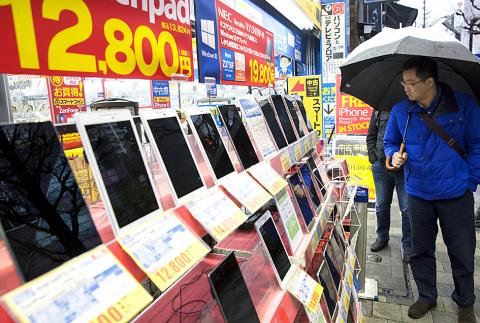The tablet craze from a few years ago showed more signs of fading this year, with most major producers reporting sales declines, market surveys showed on Thursday.
This was the 10th straight quarterly decline for tablets, International Data Corp (IDC) said.
IDC reported an 8.5 percent drop in global tablet shipments to 36.2 million.

Photo: Bloomberg
A separate survey by Strategy Analytics pegged the decline for the quarter at 10 percent.
IDC analyst Ryan Reith said the sizzling growth in tablets from 2010 to 2013 following the launch of the first iPad is now history and that many consumers are finding they can do without tablets, relying instead on smartphone or new, slimmer laptops.
“The rate at which the tablet market grew from 2010 to 2013 was unlike many other consumer-oriented device markets we’ve seen before,” Reith said.
“However, it appears for many reasons consumers became less eager to refresh these devices, or in some instances purchase them at all. We continue to believe the leading driver for this was the increased dependency on smartphones, along with rather minimal technology and form factor progression,” he said.
IDC said Apple Inc led the market with a 24.6 percent share in first quarter, despite a 13 percent sales drop.
Samsung Electronics Co sales fell 1.1 percent, but retained the No. 2 spot at 16.5 percent.
China’s Huawei Technologies Co (華為) was the only major vendor to show growth — reporting a 31.7 percent jump, garnering a 7.4 percent share, after introducing new “detachable” tablets powered by Microsoft Corp’s Windows, IDC said.
IDC estimated that Amazon.com Inc, which does not report detailed sales figures, sold 2.2 million tablets for a 6 percent market share, a drop of 1.8 percent.
Lenovo Group Ltd (聯想) held the No. 5 spot with a market share of 5.7 percent for the Chinese electronics giant, according to IDC.
Strategy Analytics, which reported similar market shares, said the growth had evaporated for Microsoft and its Surface tablets after a number of strong quarters.
“Sales performance for Windows tablets has been fantastic over the last several years, but the hero of this segment is missing in action,” Strategy Analytics’ Eric Smith said.
The Strategy Analytics survey found that sales of Windows tablets, which include Microsoft Surface devices, fell 2 percent from a year earlier to 6.3 million units, which gave the operating system a market share of 15 percent.

RUN IT BACK: A succesful first project working with hyperscalers to design chips encouraged MediaTek to start a second project, aiming to hit stride in 2028 MediaTek Inc (聯發科), the world’s biggest smartphone chip supplier, yesterday said it is engaging a second hyperscaler to help design artificial intelligence (AI) accelerators used in data centers following a similar project expected to generate revenue streams soon. The first AI accelerator project is to bring in US$1 billion revenue next year and several billion US dollars more in 2027, MediaTek chief executive officer Rick Tsai (蔡力行) told a virtual investor conference yesterday. The second AI accelerator project is expected to contribute to revenue beginning in 2028, Tsai said. MediaTek yesterday raised its revenue forecast for the global AI accelerator used

TEMPORARY TRUCE: China has made concessions to ease rare earth trade controls, among others, while Washington holds fire on a 100% tariff on all Chinese goods China is effectively suspending implementation of additional export controls on rare earth metals and terminating investigations targeting US companies in the semiconductor supply chain, the White House announced. The White House on Saturday issued a fact sheet outlining some details of the trade pact agreed to earlier in the week by US President Donald Trump and Chinese President Xi Jinping (習近平) that aimed to ease tensions between the world’s two largest economies. Under the deal, China is to issue general licenses valid for exports of rare earths, gallium, germanium, antimony and graphite “for the benefit of US end users and their suppliers

Dutch chipmaker Nexperia BV’s China unit yesterday said that it had established sufficient inventories of finished goods and works-in-progress, and that its supply chain remained secure and stable after its parent halted wafer supplies. The Dutch company suspended supplies of wafers to its Chinese assembly plant a week ago, calling it “a direct consequence of the local management’s recent failure to comply with the agreed contractual payment terms,” Reuters reported on Friday last week. Its China unit called Nexperia’s suspension “unilateral” and “extremely irresponsible,” adding that the Dutch parent’s claim about contractual payment was “misleading and highly deceptive,” according to a statement

Artificial intelligence (AI) giant Nvidia Corp’s most advanced chips would be reserved for US companies and kept out of China and other countries, US President Donald Trump said. During an interview that aired on Sunday on CBS’ 60 Minutes program and in comments to reporters aboard Air Force One, Trump said only US customers should have access to the top-end Blackwell chips offered by Nvidia, the world’s most valuable company by market capitalization. “The most advanced, we will not let anybody have them other than the United States,” he told CBS, echoing remarks made earlier to reporters as he returned to Washington